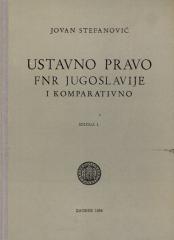
Teorija zajedničkog zločinačkog pothvata i međunarodno kazneno pravo-izazovi i kontroverze
Udruženi zločinački poduhvat (UZP) je pravna doktrina koja se koristi tokom suđenja za ratne zločine kako bi se omogućilo krivično gonjenje članova grupe za grupna dela.
Udruženi zločinački poduhvat nije bio deo međunarodnog običajnog prava u vreme kada su počinjena krivična dela koja se stavljaju na teret okrivljenima.
Udruženi zločinački poduhvat je suprotan principu krivice kao jednom od osnovnih načela savremenog krivičnog prava.
Opasnim širenjem elemenata odgovornosti udruženi zločinački poduhvat je prilično blizak krivici po udruživanju, što nije predviđeno Statutom MKSJ.
Izvođenje zaključka o postojanju namere okrivljenog iz objektivnih okolnosti (zaključak) u drugoj i trećoj kategoriji udruženog zločinačkog poduhvata je upitno sa aspekta poštovanja principa pretpostavke nevinosti okrivljenog, koji između ostalog stvari, propisano je članom 21/3 Statuta MKSJ.
Sudska praksa MKSJ u vezi sa primenom teorije udruženog zločinačkog poduhvata i odredbi Statuta u kojima je ova teorija navodno sadržana nije jedinstvena i protivrečna je principima pravne sigurnosti i pravičnosti.
Široka primena teorije udruženog zločinačkog poduhvata na celokupne političke i vojne strukture države i druga „znana i nepoznata” lica ne ispunjava uslov precizne optužbe i može stvoriti utisak „političkog uticaja” na međunarodnog krivičnog pravosuđa.
Široko zamišljene optužnice zasnovane na teoriji udruženog zločinačkog poduhvata, koje sadrže „kolektivne” optužbe ne samo lica protiv kojih je pokrenut krivični postupak, već čitavih državnih i vojnih struktura, kao i „poznatih i nepoznatih lica” prete osnove i rad MKSJ.
Davanje kredibiliteta teoriji udruženog zločinačkog poduhvata u postupcima pred međunarodnim krivičnim sudovima stvara rizik od još šire i nametljivije primene ove teorije u postupcima pred domaćim sudovima. Primena ove teorije podriva savremeno krivično pravo zasnovano na tradicionalnim principima i pravnoj dogmatici.
Široka primena teorije udruženog zločinačkog poduhvata imaće negativne posledice na proces afirmacije međunarodnog krivičnog prava i pravde.
U praksi međunarodnih krivičnih sudova, teoriju udruženog zločinačkog poduhvata treba zameniti drugim dobro utvrđenim institutima lične krivične odgovornosti, kao što su saučesništvo i indirektna krivica.
Jedan primerak je u ponudi




